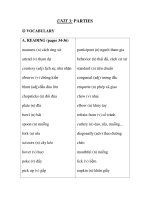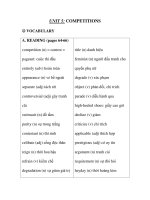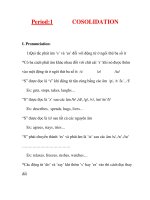Giáo án Tiếng Anh lớp 11: UNIT 13 :HOBBIES-SPEAKING pot
Bạn đang xem bản rút gọn của tài liệu. Xem và tải ngay bản đầy đủ của tài liệu tại đây (413.19 KB, 11 trang )
UNIT 13 : HOBBIES
PART B: Speaking
I.Objectives
.By the end of the lesson, the students will be able to
- make a dialogue with their partners about their hoby –
collecting stamps
- talk about their own hobbies and express the reasons they
take up such hobbies.
II.Language notes:
a. Structures:
- What is your hobby?
- How do you collect ?
- Where do you buy ?
- How do you organise ?
- Why do you collect ?
- What are you going/planning to ?
-classify something into categories, the simple present and the
simple future tense.
-
b. Vocabulary:
- stamp collecting
- chat (v)
- book stall (n)
- collection (n)
- exchange (v)
- category (n)
- classify (v)
III.Material
- Pictures , text book
- Pictures of activities: swimming, fishing, stamp-collecting,
mountain-climbing, playing compute games,
reading books, watching TV, chatting with a
friend on the phone, etc.
1. Some kinds of books, i.e. student books, comic books, novels…
2. Some name tags: student books, comic books, novels…
IV.Procedures:
-1. Checking up:( 5’)
Answer the questions:
What is the first hobby of writer?
Write some new words
Contents T & Ss’activities
I - Warm up(5’)
Guessing game:
- Call on a student and give a picture to
him/her.
- Don't let the others see the picture.
-
A student goes to the
board and gets the
picture.
- The others can't see the
picture.
-
Ask them to make Yes or
No questions to
guess:
'What are the special foods in the picture? '
'What holiday is it?'
- Show the picture on the screen.
(Can have some music about new year)
- Make Yes or No
questions to guess.
- T Arouse the students'
interest, curiosity and
provide an introduction to
the topic and content.
- Relate the content of the
lesson to the students'
own background
knowledge and interest to
motivate students.
Visual aids.
Possible Questions:
Is there a cake in the picture?
Have you got ?
Is it holiday?
- Possible Problems:
The students may misunderstand between
Yes/ No questions and Wh-questions ->
Teacher will suggest some structures as
examples.
II - Task 1: (10’)
- Introduce the situation.
- Tell the students to listen and watch the
show of the dialogue to imitate
- Set up pairs of the students in the class.
The student answers the
questions: Yes/ No.
- Look at the picture to
check the result.
- Listen to the
introduction.
- Listen and watch the
show of the dialogue to
imitate (pronunciation,
intonation )
- Work with the partner
-
Have the students work in pairs and
practice reading the
dialogue.
- Have the same pairs change roles
- Go around and help if necessary.
Language notes:
- Tell the students to list the questions that
they can use in a conversation about a
holiday or a festival.
- Call on two students to write on the board.
(Can have a competition between them)
next to them.
Work in pairs and
practice reading the
dialogue in roles.
- Change their roles; all
the members of the pairs
have role-played all the
parts.
- Can ask if have any
difficulties in
pronunciation or
vocabulary.
Memory check:
- Direct students to practice reading the
dialogue without books.
- Call on several students to role-play in
front of the class.
- Make any necessary corrections to their
conversation.
III - Task 2:(15’): make a dialogue about
collecting stamps. Use the suggested below7
- Show photos and ask:
What holiday is it?
Read aloud the words.
Tell thestudents to listen
and repeat.
-Look at the pictures
Valentine's day
Language notes:
- Show the pictures and photos:
Masks Harvest
-
- Introduce the task.
- Set up groups of the students in the class.
- Have the students work in groups
- Go around and help if necessary.
and photos to get the
meaning of new words.
- Listen to the teacher to
imitate the pronunciation
and repeat.
- Write down new words.
- Work in groups of four
students.
- Discuss and match the
holidays with its meaning
and activities.
- Write the result on the
- T reads the dialogue
Result check:
- Tell the students to handle
Roast turkey (photo)
Masks (Picture)
Parade (photo and
context)
Harvest (photo): Vô thu
ho¹ch.
“Which would you like to do?”
“ I’d like __________”
“ Why would you like to do it?”
“Because _____________”
3.Post-speaking: (7’)
twice, pays attention
to pronunciation,
stressed words.
- T explains the
phrase “classify
something into
categories” and
“name tag” by
showing some
different kinds of
books and
classifying them
into categories, then
put each of them
with a name tag.
- T has Ss practise in
pairs.
- Question:
What holiday is next two days?
- Show the pictures as a suggestion.
- Tell them to work in pairs and talk about
Christmas.
- Go around and help if necessary.
- Call on 1 or 2 students to report the result
in front of the class.
VI – Homework (3’)
- Give homework direction.
1. Take part in a discussion about holidays
and festivals on net.
2. Speaking (workbook)
-
T asks some good
pairs to present in
front of the class. (T
pays attention to
accuracy)









